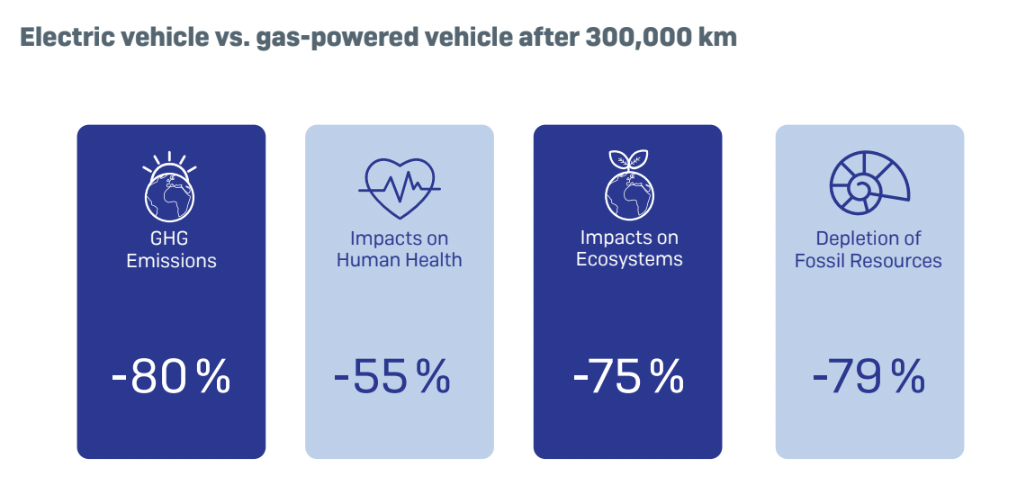Improved environmental performance
The analysis of an electric vehicle’s full life cycle shows that its environmental impacts are much less significant than those of a gas vehicle. This is especially true in Quebec, where a vehicle that runs on hydroelectricity emits up to 80% less greenhouse gases than its gasoline equivalent.
Lower environmental impact over the life cycle
The analysis of the electric vehicle’s full life cycle shows that although its environmental impacts are higher at the manufacturing stage, they are ultimately less significant than those of the gasoline vehicle. This is especially true in Québec, where electricity is 99% renewable. The environmental impacts of an electric car driven 300,000 km are 55% to 80% lower than with an equivalent conventional car.
The added impacts associated with the manufacture of electric vehicles are minimal, when compared with those avoided by not producing and burning gasoline. The environmental performance of electric vehicles compared to gasoline vehicles shows positive results in these four areas: human health, ecosystem quality, climate change and depletion of fossil resources. This data take into account vehicle parts production (including the battery), transportation to end user, vehicle usage, and end of life.

Increasingly Cleaner Electric Vehicles
In 2024, the electric car’s environmental performance is even more positive, and it keeps getting better. In fact, more and more new electric vehicles are being built using batteries from end-oflife vehicles. There are so many benefits to recycling electric batteries that automakers are now offering to take back their batteries free of charge.
Thanks to new industrial processes, battery manufacturing emits fewer GHGs and requires fewer critical metals year after year. For example, a new generation of batteries called lithium iron phosphate (LFP), considerably reduces the need for rare minerals such as cobalt and nickel.
Gasoline vehicles are getting increasingly dirty
Today, manufacturing a gasoline-powered car has a smaller impact than producing an electric vehicle. But the trend has been reversed in recent years as gasoline-powered cars become more efficient through increased hybridization (with electric motors and batteries) and the use of light metals and composite materials.
More importantly, the gasoline that powers vehicles is becoming dirtier. The share of conventional oil (the kind that bubbles up from the earth on its own) is becoming scarcer as new deposits become increasingly rare. The "peak" of conventional oil is said to have been reached in 2016 and 2018. We are now entering the era of non-conventional oil: "shale oil" and "tar sands", which are very polluting to produce. In Quebec, 100% of the oil that fuels our cars comes from the tar sands of Alberta and from shale oil wells in the United States and Western Canada.
The EV battery and its end of life
TElectric car batteries have a long lifespan: 200,000 to 500,000 km. Manufacturers generally offer an 8-year or 160,000 km warranty.
The circular industry of recycling batteries is just starting and the batteries of tomorrow's electric vehicles will have even smaller environmental impact, since they will be partly made using batteries from today's vehicles. At the end of their lifespan, batteries can be reused for energy storage purposes. The Quebec company Recyclage Lithion has developed an efficient process to recycle lithium-ion batteries, which should be operational soon.
All the details are here (hyperlink to secondary page)
Christine Beaulieu investigates: Can we recycle electric car batteries? (in French).
The source of energy to recharge the battery
In Quebec, 99.7% of our electricity is produced from renewable sources that do not emit greenhouse gases, which is an advantage compared to other parts of the world where electricity is produced from fossil fuels. It should be noted that globally, the trend is towards a decarbonization of energy sources.
Other recent studies point in the same direction
TThe vast majority of scientific studies support electrifying transportation. For more information, you can consult three of the most enlightening resources on the subject:
- Life Cycle Analysis Comparaison (Fuel Institute), 2022 : A detailed report that compares the impacts of electric vehicles and gasoline vehicles, in the context of the United States. The report demonstrates that electric vehicles can significantly reduce greenhouse gas emissions, as well as total costs of ownership for the consumer.
- Gasoline versus electric cars? Here’s how their life cycle emissions compare in Canada : detailed article written by analyst Barry Saxifrage of the Canada's National Observer. A comparative analysis of the impacts on the fight against climate change of the electric car, between Canadian provinces.
- A global comparison of the life-cycle greenhouse gas emissions of combustion engine and electric passenger cars (ICCT), 2021 : very comprehensive article that compares vehicle emissions with all available forms of energy and world region, in Europe, the United States, China and India. This analysis also balances the foreseeable evolution of the various energy productions until 2030.
- CarbonCounter (MIT) 2021: tool developed by MIT to compare the environmental footprint of different models of electric vehicles. All parameters are adjustable and documented.
- Hoekstra, A. The Underestimated Potential of Battery Electric Vehicles to Reduce Emissions. Joule, Volume 3, Issue 6, 19 June 2019: article on the underestimated potential of electric vehicles to reduce greenhouse gas emissions.
- Knobloch, F., Hanssen, S., Lam, A. et al. Net emission reductions from electric cars and heat pumps in 59 world regions over time. Nat Sustain 3, 437–447 (2020) : article which analyzes the impact of electrifying transportation and the use of "heat pumps" (for heating and air conditioning) around the world, in relation to the announced decarbonization of electricity production..